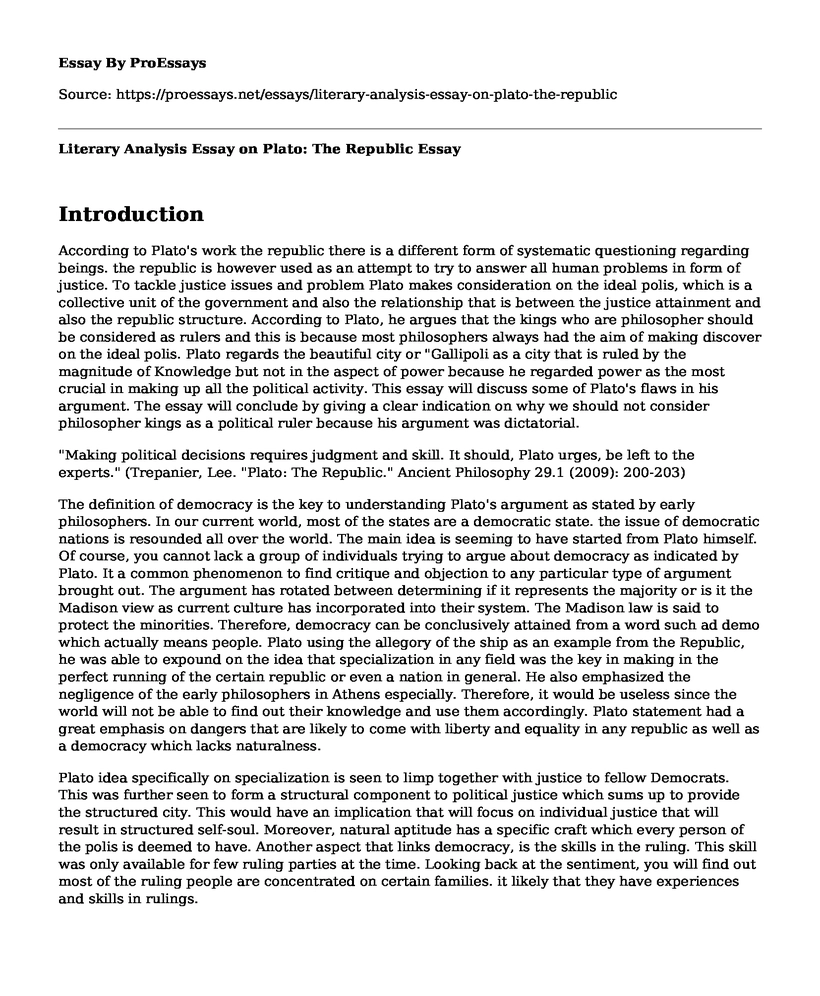Introduction
According to Plato's work the republic there is a different form of systematic questioning regarding beings. the republic is however used as an attempt to try to answer all human problems in form of justice. To tackle justice issues and problem Plato makes consideration on the ideal polis, which is a collective unit of the government and also the relationship that is between the justice attainment and also the republic structure. According to Plato, he argues that the kings who are philosopher should be considered as rulers and this is because most philosophers always had the aim of making discover on the ideal polis. Plato regards the beautiful city or "Gallipoli as a city that is ruled by the magnitude of Knowledge but not in the aspect of power because he regarded power as the most crucial in making up all the political activity. This essay will discuss some of Plato's flaws in his argument. The essay will conclude by giving a clear indication on why we should not consider philosopher kings as a political ruler because his argument was dictatorial.
"Making political decisions requires judgment and skill. It should, Plato urges, be left to the experts." (Trepanier, Lee. "Plato: The Republic." Ancient Philosophy 29.1 (2009): 200-203)
The definition of democracy is the key to understanding Plato's argument as stated by early philosophers. In our current world, most of the states are a democratic state. the issue of democratic nations is resounded all over the world. The main idea is seeming to have started from Plato himself. Of course, you cannot lack a group of individuals trying to argue about democracy as indicated by Plato. It a common phenomenon to find critique and objection to any particular type of argument brought out. The argument has rotated between determining if it represents the majority or is it the Madison view as current culture has incorporated into their system. The Madison law is said to protect the minorities. Therefore, democracy can be conclusively attained from a word such ad demo which actually means people. Plato using the allegory of the ship as an example from the Republic, he was able to expound on the idea that specialization in any field was the key in making in the perfect running of the certain republic or even a nation in general. He also emphasized the negligence of the early philosophers in Athens especially. Therefore, it would be useless since the world will not be able to find out their knowledge and use them accordingly. Plato statement had a great emphasis on dangers that are likely to come with liberty and equality in any republic as well as a democracy which lacks naturalness.
Plato idea specifically on specialization is seen to limp together with justice to fellow Democrats. This was further seen to form a structural component to political justice which sums up to provide the structured city. This would have an implication that will focus on individual justice that will result in structured self-soul. Moreover, natural aptitude has a specific craft which every person of the polis is deemed to have. Another aspect that links democracy, is the skills in the ruling. This skill was only available for few ruling parties at the time. Looking back at the sentiment, you will find out most of the ruling people are concentrated on certain families. it likely that they have experiences and skills in rulings.
Conclusion
In conclusion, Plato argues that "there would be no end to all the states troubles and also humanities itself and also the aspect of a ruler coming from a philosopher, philosophy and political power in the same hands". Of course, his argument regarding the rule of knowledge is very ideal but I can be considered as very unrealistic. As Plato argues that a human being is an animal in politics and hence it could be inevitable to everyone because politics is a dirty game and has a variable effect on us. I would conclude that his argument is trying to encourage not to involves ourselves with politics but on the other hand leave all our human right to a dictator. And for this reason, I would say his reasoning is unrealistic.
Work cited
Trepanier, Lee. "Plato: The Republic." Ancient Philosophy 29.1 (2009): 200-203.
Cite this page
Literary Analysis Essay on Plato: The Republic. (2022, Oct 20). Retrieved from https://proessays.net/essays/literary-analysis-essay-on-plato-the-republic
If you are the original author of this essay and no longer wish to have it published on the ProEssays website, please click below to request its removal:
- Life of Thomas Jefferson Before and After Signing The Declaration of Independence
- Lincoln's View of the Political Problems Essay
- Cleopatra: A Life, Book Review
- Functionalism, Behaviorism and Identity Theory Essay
- Letter to John Adams by Abigail Adams Analysis Essay
- Colonial Powers Clashed in America: France, England, Spain - Research Paper
- Ethics of Information Technology: Balancing Surveillance, Privacy, and Social Welfare - Paper Example







